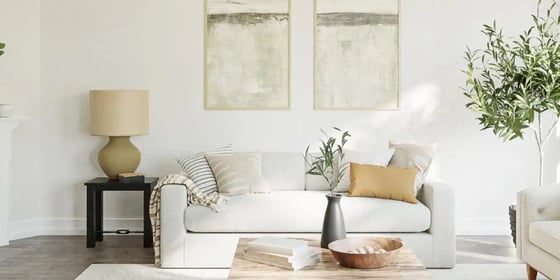Renting in Germany: House Rules, Tenants Rights & more

Contents
Welcome to Germany! After years of planning and saving, you've finally arrived and are ready to dive into the rental market. As you begin your search for the perfect apartment, you'll quickly discover that renting a home here involves more than just finding the right place. It's about understanding the unique behavioral aspects, house rules, and tenant rights that shape the German renting experience.
This guide is designed to help you navigate these intricacies. Along the way, you'll learn how to interact with landlords effectively, adhere to common house rules, and understand your rights as a tenant. With this knowledge, you can start your journey with confidence and make the most of your new life in Germany by following the insights and tips in this comprehensive guide.
Renting in Germany: City vs. rural Areas
When moving to Germany, choosing between renting in a city or a rural area involves more than just comparing prices. Behavioral aspects, such as lifestyle, community interactions, and daily routines, play a significant role in this decision. Here's what you need to know to make an informed choice.
What it's like to live in Munich or Berlin
Living in a major city like Berlin, Munich, or Hamburg offers numerous advantages but also comes with its own set of behavioral expectations and challenges. Cities are bustling with activity. If you thrive in a fast-paced environment with many social interactions, city life might be for you. Berlin's vibrant nightlife and cultural events keep the city alive around the clock. City dwellers often lead busy lives, which means social interactions might be frequent but brief. Building deeper relationships can take more effort. Additionally, cities offer excellent public transportation, numerous shops, and entertainment options within walking distance.
Rental Properties in Rural Areas
Renting in rural areas offers a different set of experiences and expectations, which can be appealing depending on your lifestyle preferences. For example, rural areas have a slower pace of life, which can be ideal if you prefer a peaceful environment. You will often find tight-knit communities where people know each other well. Social interactions are typically more meaningful but less frequent. Participate in local events and get to know your neighbors to integrate better.
Regional Differences: Explained for Foreigners
Germany is a country with diverse regions, each having its own unique cultural and behavioral characteristics. Understanding these regional differences can help foreigners adapt more easily to their new environment.
Behavioral Traits
- North: People in Northern Germany, including cities like Hamburg and Bremen, are often perceived as more reserved and straightforward. This region is known for its pragmatism and a no-nonsense attitude.
- South: In contrast, Southern Germans, particularly in Bavaria and Baden-Württemberg, are known for their warmth and hospitality. Social gatherings and traditions like Oktoberfest reflect the region's emphasis on community and celebration.
Historical Context
- East: The former East Germany (GDR) has a distinct history that still influences behaviors today. People in eastern regions like Saxony and Brandenburg may exhibit a strong sense of community and resilience, shaped by their experience under socialist rule.
- West: Western Germany, including cities like Frankfurt and Cologne, has been influenced by longer exposure to Western European economic and cultural developments. This region is known for its openness to innovation and diversity.
You can also read our guide to the cost of living in Germany to learn more about regional differences.
Behavioral Aspects and Rules for Renting a Flat in Germany
In Germany, most rental properties have a set of house rules known as Hausordnung. These rules are designed to maintain order and respect among tenants and typically cover various aspects of communal living. Common house rules include:
- Quiet Hours (Ruhezeiten): Tenants are expected to observe quiet hours, usually between 10 PM and 6 AM on weekdays and throughout the day on Sundays and public holidays. During these times, loud noises such as playing music loudly, vacuuming, or running washing machines should be avoided.
- Waste Disposal: Proper waste disposal and recycling are strictly enforced. Tenants must separate their waste into categories such as paper, plastic, organic waste, and general trash and dispose of them in the designated bins.
- Cleaning Duties: In buildings with shared areas, tenants may be required to participate in cleaning common spaces like hallways, staircases, and laundry rooms. Some buildings have a rotating schedule for these tasks.
- Maintenance of Shared Areas: Tenants are expected to help maintain shared areas, such as gardens or courtyards, and report any damages or issues to the landlord promptly.
- Pet Regulations: If pets are allowed, there may be specific rules regarding their care and behavior to ensure they do not disturb other tenants.
Tip
Most people in Germany prefer unfurnished over furnished apartments. This way, they have more flexibility in decorating and settling in. But you can also find furnished apartments, most of which are sublets for a certain period.
Cultural Norms you need to know before moving to Germany
Knowing and respecting cultural norms is essential for integrating smoothly into the German culture. Here are some key aspects:
- Punctuality: Germans value punctuality highly. Whether it’s for appointments with landlords, viewings, or paying monthly rent, being on time is crucial and seen as a sign of respect and reliability.
- Communication: Clear and direct communication is appreciated. If you have concerns or issues, it’s best to address them promptly and professionally with your landlord or property manager.
- Respect for Privacy: While being friendly with neighbors is important, respecting their privacy and personal space is equally important. Avoid intrusive behavior and maintain a polite distance unless invited to socialize.
- Compliance with Rules: Following the established house rules and respecting the community guidelines demonstrates your commitment to being a considerate tenant. Non-compliance can lead to disputes or even eviction.
- Participation in Community: In many rental communities, especially in smaller towns or rural areas, being an active and positive member of the community is valued. Participating in local events and respecting traditions can help build good relationships with neighbors.
By understanding and adhering to these house rules and cultural norms, you can ensure a respectful and harmonious living experience in Germany. This approach helps build good relationships with landlords and neighbors and enhances your overall experience of living in a new country.
Tenant Rights for Renting an Apartment in Germany
Renting an accommodation or property in Germany comes with a comprehensive set of legal protections and rights for tenants. Understanding these rights is crucial for ensuring a fair and trouble-free renting experience. Here’s an overview of key aspects related to tenant rights, lease agreements, and dispute resolution. By the way, the same rules apply to renting a house in Germany.
Legal Protections for Tenancy
Tenants in Germany benefit from robust legal protections under the German Civil Code (Bürgerliches Gesetzbuch or BGB). These laws are designed to safeguard tenants' interests and ensure fair treatment by landlords. Key protections include:
- Rent Control: In many cities, rent increases are regulated to prevent excessive hikes. The "Mietpreisbremse" (rent brake) limits rent increases in areas with tight housing markets.
- Security of Tenure: Tenants have strong protections against eviction. Landlords can only terminate a lease for specific reasons, such as personal use or significant breaches of the lease by the tenant. Even then, the notice periods are usually long, often up to three months.
- Right to a Habitable Home: Landlords are required to maintain the property in a habitable condition. This includes ensuring necessary repairs and maintenance are carried out promptly.
Lease Agreements & rental Contracts
A lease agreement (Mietvertrag) is a legally binding document that outlines the terms and conditions of the rental arrangement. Key elements to look out for in rental contracts include:
- Duration of the Lease: Leases can be fixed-term or indefinite. It’s essential to know the type of lease you are signing.
- Rent Amount and Additional Costs: The contract should clearly state the rent amount (Kaltmiete) and any additional costs (Nebenkosten), such as utilities and maintenance fees.
- Deposit (Kaution): Typically, the deposit is equivalent to three months' rent. The lease should specify the amount and conditions for its return.
- Maintenance and Repairs: Clarify the responsibilities for minor repairs and maintenance. Generally, landlords handle major repairs, while tenants may be responsible for minor fixes.
- Notice Periods: Understand the notice periods for terminating the lease. For tenants, this is usually three months, but it can vary depending on the lease terms.

Tip
If you cannot continue your lease, subletting can be an option. Ensure you have the landlord's permission and understand the subletting process and associated costs. Finding a trustworthy tenant and negotiating lease terms are crucial steps.
Dispute Resolution with Landlords
Despite best efforts, disputes between tenants and landlords can arise. Germany has well-defined processes for resolving these conflicts:
- Communication: Initially, try to resolve issues through direct communication with the landlord. Clear, documented communication can often resolve disputes amicably.
- Tenant Associations (Mietervereine): Joining a tenant association can provide legal advice and support. These organizations offer services to help resolve disputes and protect tenant rights.
- Legal Action: If disputes cannot be resolved through negotiation, tenants can seek legal recourse. Germany has specialized rental courts (Mietgerichte) that handle such cases. It’s advisable to consult a lawyer experienced in tenancy law before proceeding with legal action.
Tip
If you encounter issues such as mold, defects, or nuisances from neighboring constructions, contact the property management (Hausverwaltung). Legitimate concerns may qualify you for a rent reduction.
Things to Know Before Renting an Apartment in Germany
Renting and living in Germany involves understanding several key aspects to ensure a smooth and pleasant experience. Here are some tips on what you need to know.
Tenant Privacy and Rights
German rental laws provide tenants with the right to privacy and quiet enjoyment of their homes. Landlords cannot enter your apartment without prior notice or permission, except in emergencies. They are also not allowed to make changes to your apartment without your consent. Ensure your lease contract outlines your rights and responsibilities as a tenant.
Tip
Joining a tenants' association in your region can offer legal advice and support. Membership fees vary, but these associations can be invaluable for navigating any concerns.
Liability Insurance
Having liability insurance (Haftpflichtversicherung) is essential when renting in Germany. This insurance protects you from unexpected events that could leave you liable for property damage or legal fees. The insurance cost is reasonable, starting at around €5 per month. Some examples of house liability insurance may be found on our Insurances page.
Kitchens in Apartments
Be aware that many German apartments do not come with a kitchen. If the apartment lacks a kitchen, ask about the possibility of having one installed. Sometimes, you can negotiate with the landlord to add a kitchen for an additional charge. Most Germans bring their own kitchen or buy a new one when renting a new apartment.
Final Preparations
Before moving into your new apartment, ensure you have all necessary documents and information, including a signed lease agreement, proof of renters' insurance, a copy of your passport or ID card, and bank statements showing your ability to pay rent. If you want to learn more about the process of finding and renting a place to live, read our article about how to rent an apartment in Germany.
Expatrio Value Package
Simplify your move to Germany with Expatrio's Value Package. Get your Blocked Account + mandatory Health Insurance and other free benefits.
This might also be of interest to you

Buying Property in Germany as an Expat
Many expats who move to Germany eventually want to stop renting and buy their own place. The good news: in Germany, foreigners are generally allowed...

How to Move to Germany as an American in
Germany is one of the most popular destinations for Americans looking to relocate to Europe. Whether you’re moving for work, education, or simply for...

Driving in Germany
Driving on the right side of the road & tips on how to drive safely in the country. We all know that there is the Autobahn in Germany and that there...

German Supermarkets
Important things to know when buying groceries in Germany If you're new to Germany, you'll soon discover that most local grocery stores have an...

Driving licence in Germany for foreigners
Have you ever wondered how to get a German driver's license at a certified driving school?

German Holidays and Celebrations
Germany enjoys a number of national and regional public holidays and other festivities that take place throughout the year. Those moving to Germany...

German Months
Fundamental to learning any language is becoming familiar with how to talk about days, weeks, months, and years. Mastering how to communicate about...

